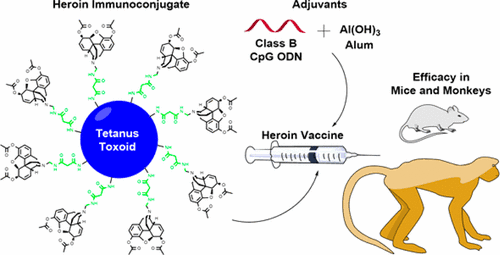This is my entry for the 4th Himal Contest
Greetings steemians, hope you have a beautiful and productive week.
In this post I want to share with you a really unique type of vaccine that I heard about a few days ago. What makes this vaccine stand out is that it doesn't target a disease. Instead, it targets a drug addiction!
The vaccine, which is still in the pre-clinical stages, targets the effects of heroin, and it may one day help addicts overcome their problem by training their immune system to deactive heroin molecules. Following tests on rhesus monkeys, the vaccine was deemed successful and very promising by the scientists behind it. In the past, the vaccine had also been tested with success in rodents.
The vaccine is developed by a research team from the Scripps Research Institute, led by chemistry professor Kim Janda.
"There is an urgent need to discover effective medications to treat substance use disorders. Increasingly, drug users are turning to opioids and powerful synthetic versions of these drugs that can sometimes be as much as 100 times more potent than heroin. Moreover, many patients receiving treatment relapse." said Kim D. Janda, Ph.D., who led the research into the vaccine
How does it work?
The main idea behind the vaccine is to somehow make our body’s immune system to react and bind to the opioid molecules the same way it does when encountering a pathogen. That would stop them from entering the brain and cause their effects in the first place.
The main problem the team faces is that opioid drugs are very small molecules that our immune system simply can't recognize. One way to make the immune system react to these molecules is to link them to a larger biological molecule like a protein so that the body can detect them and start an in immunological response.
But that's only the generic idea, actually achieving this is way harder than it sounds.
To get an immunolical response, Janda’s team created molecules called haptens, that resemble the opioid molecules, with proteins attached called epitopes that act as a binding site for the antibodies.
These molecules act as a proxy gradually "training" the immune to recognize opioids and eventually attack them.
In the last experiment, the vaccine was administered in three doses, to four animals (rhesus macaques) and successfully created an immunological reaction to heroin. The effects were more noticeable during the first month after vaccination but the overall effect lasted for about eight months. No side effects were reported.
What to expect?
In the past, similar vaccines were developed but they all failed to pass pre-clinical trials. This is the first vaccine of its kind to reach this stage. Although development started eight years ago, there is gonna be a long road until we get to see any widespread application in humans. Even if human trials were to begin tomorrow, it would take at least 5-7 years before mainstream adoption.
And even if proven to be successful, the vaccine will not be a treatment for opioid addiction, merely a tool in tackling it:
"Vaccines are meant to be used by people who want to quit taking drugs. If you don't want to stop then nothing will help. The idea is that if they have a moment of weakness, they won't relapse and can continue with their therapy." said Janda to The Guardian. [3]
